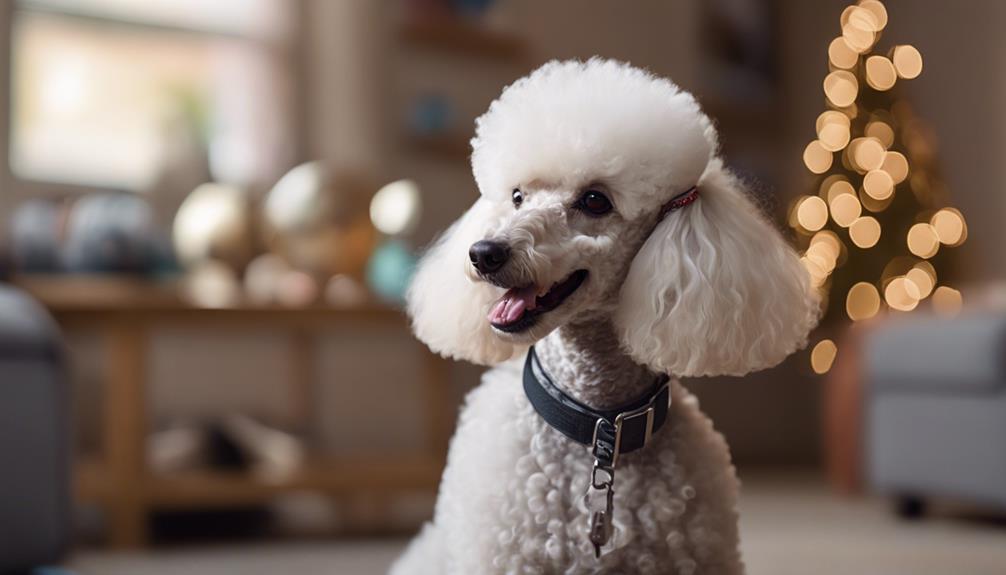When honing training techniques for your poodle, it's crucial to take into account their unique character traits and inclinations. Understanding how your poodle responds to various stimuli can significantly impact the success of your training sessions. By tailoring your approach to fit their personality, you can foster a more harmonious and productive training dynamic. But how exactly can you decipher what works best for your poodle? Stay tuned to uncover practical tips and insights to help you navigate the intricacies of tailoring training methods to your poodle's individuality.
Key Takeaways
- Understand your poodle's unique traits and behaviors for tailored training success.
- Personalize training techniques to match your poodle's individual needs and preferences.
- Adapt rewards, commands, and activities to suit your poodle's temperament and preferences.
- Use consistent cues and methods while incorporating engaging activities for effective training.
Personality Assessment for Tailored Training

To ensure effective and personalized training for your poodle, the first step is conducting a thorough personality assessment to understand their unique traits and behaviors. By delving into your poodle's personality, you can tailor your training methods to suit their specific needs and preferences. Recognizing whether your poodle responds best to food rewards, playtime, or verbal praise allows you to customize the training experience for maximum engagement.
Understanding your poodle's energy levels, attention span, and preferred forms of reinforcement is crucial in developing a successful training regimen. By adapting your techniques to align with their personality traits, such as sensitivity, intelligence, and social behavior, you can create a training environment that caters to their individuality.
Understanding Poodle Behavior Traits

Understanding your poodle's behavior traits is key to effective training. Each poodle has its own unique characteristics that influence how they respond to training methods. By recognizing these traits, you can tailor your approach to suit your poodle's individual needs and enhance the training experience.
Poodle Behavior Characteristics
Exploring Poodle behavior characteristics provides insights into tailoring effective training methods for these intelligent and sensitive dogs. When understanding poodle behavior traits, keep in mind the following:
- Intelligence and Adaptability: Poodles are quick learners, responding well to positive training methods that stimulate their minds.
- Emotional Sensitivity: Their sensitivity requires a gentle and encouraging approach to training to ensure their well-being and progress.
- Preventing Boredom: Providing mental stimulation is crucial for poodles to prevent boredom and potential behavioral issues.
Personality Traits of Poodles
When tailoring training methods for your poodle, consider their unique personality traits to ensure effective learning experiences and a stronger bond between you and your furry companion. Poodles are intelligent, trainable, and eager to please, displaying a range of personalities from outgoing to reserved. Understanding these traits is key to customizing training approaches. Some poodles excel with food rewards, while others prefer play or verbal praise during training. Adapting your training techniques to match your poodle's specific personality fosters a deeper connection and enhances the learning process. By recognizing and working with your poodle's individuality, you can create a positive training environment that caters to their needs and strengthens your relationship.
Customizing Training Techniques Effectively
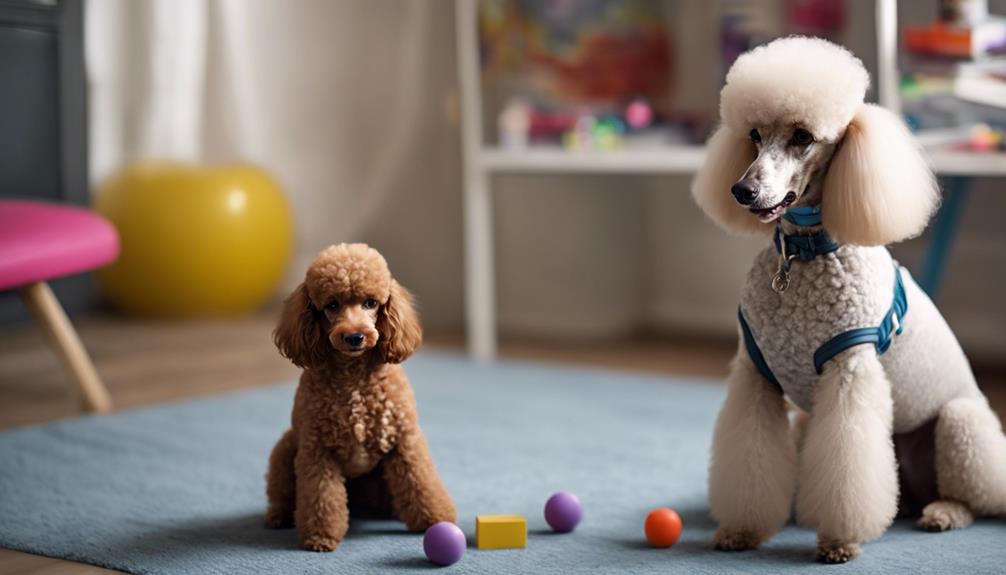
When it comes to training your poodle, it's crucial to tailor your methods to match their unique personality. By adapting techniques to suit your poodle's traits, you can create a more effective and enjoyable training experience. Remember, individualized strategies based on your poodle's preferences will lead to better results in their learning journey.
Personality-Based Training Approach
To effectively customize training techniques for your poodle based on their personality, understanding their unique traits is essential. When tailoring your approach, consider the following:
- Identify Personality Traits: Recognize if your poodle is intelligent, playful, sensitive, or independent to tailor your training method accordingly.
- Choose Appropriate Rewards: Some poodles respond better to treat-based rewards, while others thrive with play or verbal praise during training sessions.
- Enhance Bonding: Adapting training techniques to suit your poodle's personality not only fosters a strong bond but also promotes enjoyable training experiences for both you and your poodle.
Adapting to Poodle's Traits
Wondering how to effectively tailor your poodle's training techniques to match their unique personality traits? Understanding your poodle's individual traits such as sensitivity, intelligence, and energy levels is key to customized training. By adapting rewards, commands, and activities to suit your poodle's temperament and preferences, you can create tailored training methods that resonate with them. Some poodles may respond better to play-based training, while others might excel with treat-focused or praise-centered approaches. Customizing training methods to align with your poodle's personality fosters a strong bond between you and your furry companion, enhances the learning experience, and encourages positive behavior. Remember, each poodle is unique, so embracing their individuality through personalized training strategies is essential for their growth and development.
Individualized Training Strategies
To effectively customize your poodle's training techniques, it is essential to understand and adapt to their individual personality traits. Tailoring training methods to suit your poodle's unique characteristics can significantly impact their learning and progress. Here are some key strategies for customized training:
- Identify Your Poodle's Preferences: Recognize whether your poodle responds best to treats, play, or physical activities as rewards.
- Adjust Training Approaches: Be flexible in your methods based on your poodle's energy levels, inclinations, and attention span.
- Maintain Engagement: Keep your poodle engaged by incorporating activities that align with their personality traits, ensuring a positive and effective training experience.
Adapting to Different Poodle Personalities

Understanding your poodle's unique personality is key to tailoring effective training methods that suit their individual needs and preferences. Poodles can have a wide range of personalities, from outgoing and eager to please, to more reserved and independent. By recognizing these traits in your poodle, you can adapt your training methods accordingly. Some poodles may respond better to treat-based rewards, while others may prefer play or verbal praise. Adapting your training techniques to match your poodle's personality not only enhances the effectiveness of the training but also strengthens the bond between you and your furry friend. It's important to observe your poodle's responses and adjust your training approaches as needed. This attentiveness can lead to better engagement and quicker learning progress, making the training experience more enjoyable for both you and your poodle. By adapting to your poodle's personality, you pave the way for successful training sessions and a harmonious relationship.
Behavioral Modification Strategies
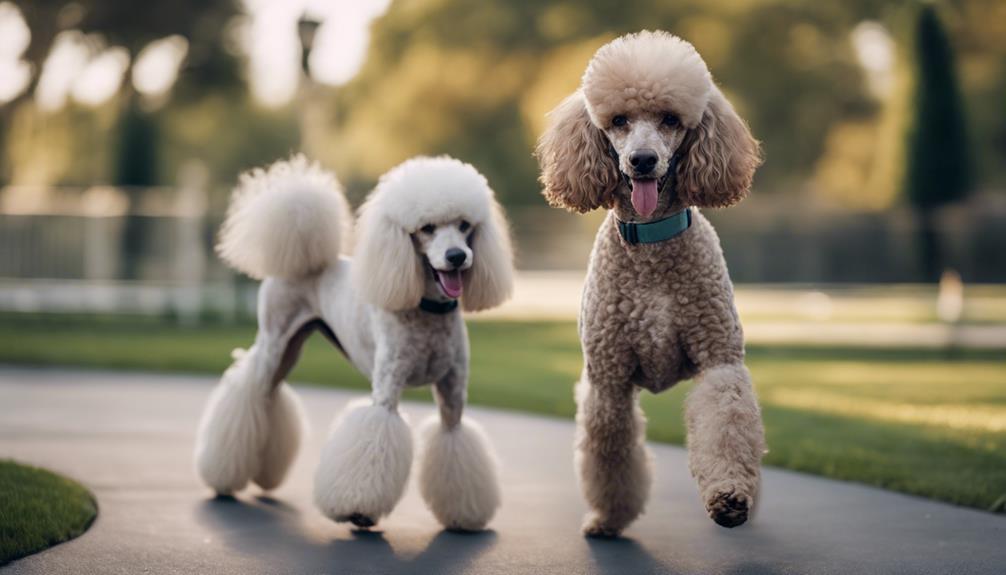
Begin by assessing the specific behaviors you want to modify in your poodle and consider how their unique personality traits may influence their responses to different training techniques. Understanding your poodle's behavioral tendencies and personality traits is crucial in effectively modifying their behavior. Here are some practical strategies to help you tailor your training methods:
- Positive Reinforcement: Utilize treats, playtime, or verbal praise to positively reinforce good behavior. Different poodles may respond better to varying forms of positive reinforcement.
- Consistency is Key: Maintain a consistent training schedule and approach to help your poodle understand what is expected of them. Consistency helps reinforce desired behaviors over time.
- Patience and Understanding: Be patient with your poodle as they learn and adjust. Each poodle is unique, and it may take time for them to adapt to new behaviors. Understanding their personality traits can aid in modifying behavior effectively.
Training for Emotional Sensitivity

For emotionally sensitive poodles, employing gentle and patient training methods is crucial to nurturing their confidence and trust. These poodles may react strongly to changes in their environment or routine, requiring a tailored approach to training. Positive reinforcement and consistency play key roles in shaping their behavior. Understanding their emotional needs and respecting their sensitivity can lead to successful training outcomes. When working with emotionally sensitive poodles, it is important to be patient and compassionate, using gentle methods to build their confidence. Tailoring training approaches to cater to their emotional sensitivity can enhance their learning experience and strengthen the bond between you and your poodle. By focusing on positive reinforcement and creating a safe and supportive environment, you can help your emotionally sensitive poodle thrive and reach their full potential.
Handling Poodle's Energy Levels
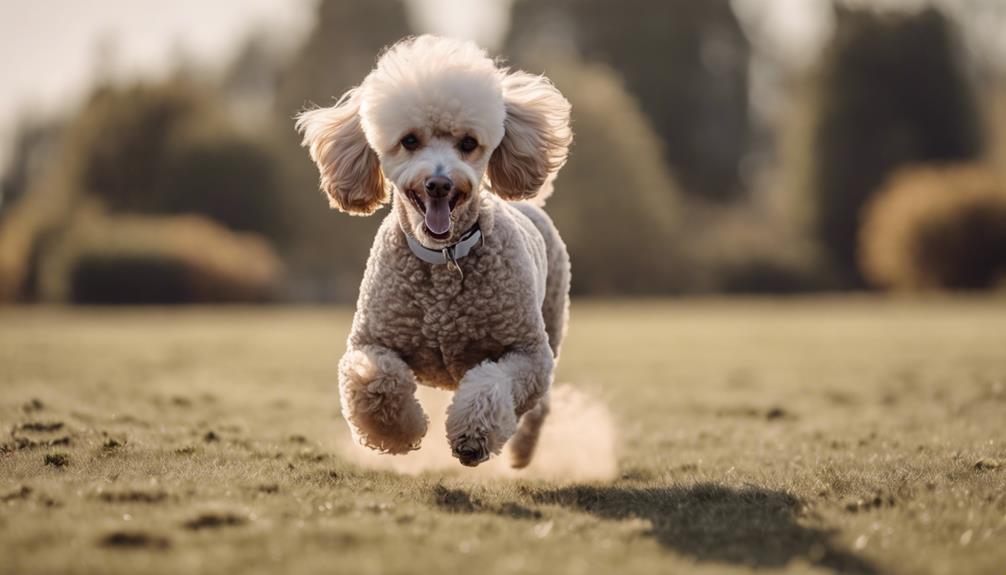
To effectively manage your poodle's high energy levels, engaging them in a variety of physical and mental activities is essential. Poodles are energetic dogs that require adequate stimulation to prevent behavioral challenges due to excess energy. Here are some strategies to help you tailor your training to your dog's energy levels:
- Daily Exercise: Regular walks, interactive play sessions, and agility exercises are great ways to channel your poodle's energy positively.
- Obedience Training: Incorporating obedience training sessions not only provides mental stimulation but also helps in teaching your poodle to focus their energy constructively.
- Mental Stimulation: Introduce puzzle toys, food-dispensing toys, and interactive games to challenge your poodle mentally and prevent boredom-induced behavioral issues.
Implementing Consistent Training Approaches
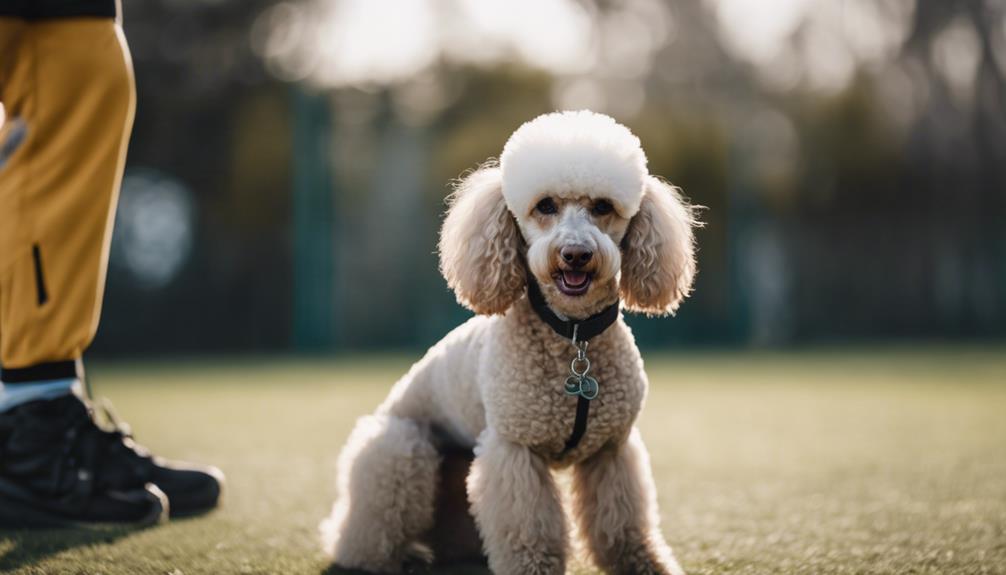
When implementing consistent training approaches for your poodle, remember to tailor your methods to match their unique personality traits and learning style. Understanding your poodle's energy levels, sociability, and motivation will help you choose the most effective training techniques. Consider adapting your approach based on whether your poodle is food-motivated, play-driven, or praise-oriented. Consistency is key to reinforcing desired behaviors and preventing confusion. By using the same cues and methods each time, your poodle will learn faster and more effectively. Incorporate activities that align with your poodle's preferences, such as agility, obedience, or interactive games, to make training enjoyable for both of you. Pay attention to your poodle's responses during training sessions, adjusting your methods as needed to optimize learning and strengthen the bond between you. By staying consistent and observant, you can create a positive training environment that promotes growth and understanding for your poodle.
Frequently Asked Questions
How Do You Discipline a Poodle?
When disciplining your poodle, focus on positive reinforcement, consistent boundaries, and redirecting behavior. Use rewards and praise to encourage good behavior. Be patient and understanding, avoiding harsh punishment. Stay consistent to shape their actions effectively.
What Is the Best Age to Train a Poodle?
Start training your poodle around 8 weeks for early socialization and puppy obedience. Use positive reinforcement to shape behavior in developmental stages. This builds a strong bond and establishes good habits for a well-adjusted adult poodle.
How Do You Train a Poodle to Stay?
To train your poodle to stay, start in a familiar spot with high-value treats. Use positive reinforcement and gradually increase stay duration. Practice in various environments with distractions, stay consistent, be patient, and provide clear signals.
How Many Commands Can a Poodle Learn?
You can teach your poodle 50 to 100 commands. Use positive reinforcement, consistency, and mental stimulation in training. Tailor techniques to suit your poodle's personality. Regular practice helps expand their learning potential.
Conclusion
In conclusion, tailoring training methods to your poodle's personality can make a world of difference in their learning journey. Remember, Rome wasn't built in a day, and neither is a well-trained poodle! So take the time to understand your furry friend's unique traits and preferences, and adjust your training techniques accordingly. With patience, consistency, and a dash of creativity, you'll be amazed at how quickly your poodle can learn and grow. Happy training!
